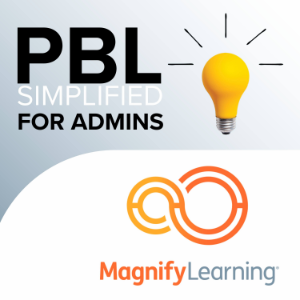
PBL Simplified for Administrators by Magnify Learning
Education Podcasts
WHAT: PBL Podcast for School Administrators FREE RESOURCE: WhatisPBL.com for free PBL Resources for Administrators PBL Simplified for Administrators Helping School Leaders Launch Their PBL Vision Project Based Learning (PBL) isn’t just for classrooms—it’s a transformative school-wide approach that starts with leadership. Hosted by Ryan Steuer, founder of Magnify Learning, this podcast is designed exclusively for school administrators, principals, and district leaders who are ready to implement and sustain PBL in their schools. Each episode breaks down real-world leadership strategies to help you build a thriving PBL culture, from crafting a clear vision to supporting teachers and engaging your community. Tune in for solo episodes with Ryan packed with actionable insights, as well as guest interviews with top educational leaders who share their challenges, wins, and best practices in making PBL a success. If you're ready to shift from traditional instruction to authentic, learner-driven education, this is the podcast for you. 🎧 Subscribe now and start leading the PBL movement in your school!
Location:
United States
Genres:
Education Podcasts
Description:
WHAT: PBL Podcast for School Administrators FREE RESOURCE: WhatisPBL.com for free PBL Resources for Administrators PBL Simplified for Administrators Helping School Leaders Launch Their PBL Vision Project Based Learning (PBL) isn’t just for classrooms—it’s a transformative school-wide approach that starts with leadership. Hosted by Ryan Steuer, founder of Magnify Learning, this podcast is designed exclusively for school administrators, principals, and district leaders who are ready to implement and sustain PBL in their schools. Each episode breaks down real-world leadership strategies to help you build a thriving PBL culture, from crafting a clear vision to supporting teachers and engaging your community. Tune in for solo episodes with Ryan packed with actionable insights, as well as guest interviews with top educational leaders who share their challenges, wins, and best practices in making PBL a success. If you're ready to shift from traditional instruction to authentic, learner-driven education, this is the podcast for you. 🎧 Subscribe now and start leading the PBL movement in your school!
Twitter:
@magnifylearning
Language:
English
Reimagining CTE Through Partnerships and Purpose With Jason Lucia | E256
Duration:00:40:57
A Simple Reflection Protocol Every School Leader Should Use | E255
Duration:00:11:55
What Great Leaders Do When School Is Quiet | E254
Duration:00:10:54
How to Plan a PBL Movement | E253
Duration:00:18:04
How to Be a Top 10% School | E252
Duration:00:18:12
5 Reasons People Don't Do PBL | E251
Duration:00:20:35
Innovations Within Education With Simon Holzapfel | E250
Duration:00:20:17
CTE and PBL: Real-World Learning at Its Best | E249
Duration:00:16:29
Finding Joy in Leadership with Amy Balsbaugh | E248
Duration:00:25:00
Why 21st Century Skills Matter More Than Ever | E247
Duration:00:17:25
Building Changemaker Micro Schools with David Richards | E246
Duration:00:32:51
Is PBL Too Hard? | E245
Duration:00:15:29
Building a School That Changes Lives with Matt Dehart | E244
Duration:00:38:01
Prevent Random Acts of STEM With Project Based Learning | E243
Duration:00:15:20
3 Solutions PBL Brings to CTE | E242
Duration:00:18:44
Fostering Independent Thinkers in Higher Education With Marsha Enright | E241
Duration:00:28:59
5-year Plan for Successfully Implementing Project Based Learning | E240
Duration:00:40:19
Empowering Future Leaders: The Weight Behind the Spear With Dr. Josh McConkey | E239
Duration:00:27:44
Optimism Is Radical: Leading Change with Jill Reilly | E238
Duration:00:57:42
A District Wide Project Based Learning Movement With Ashley Curtin | E237
Duration:00:40:55